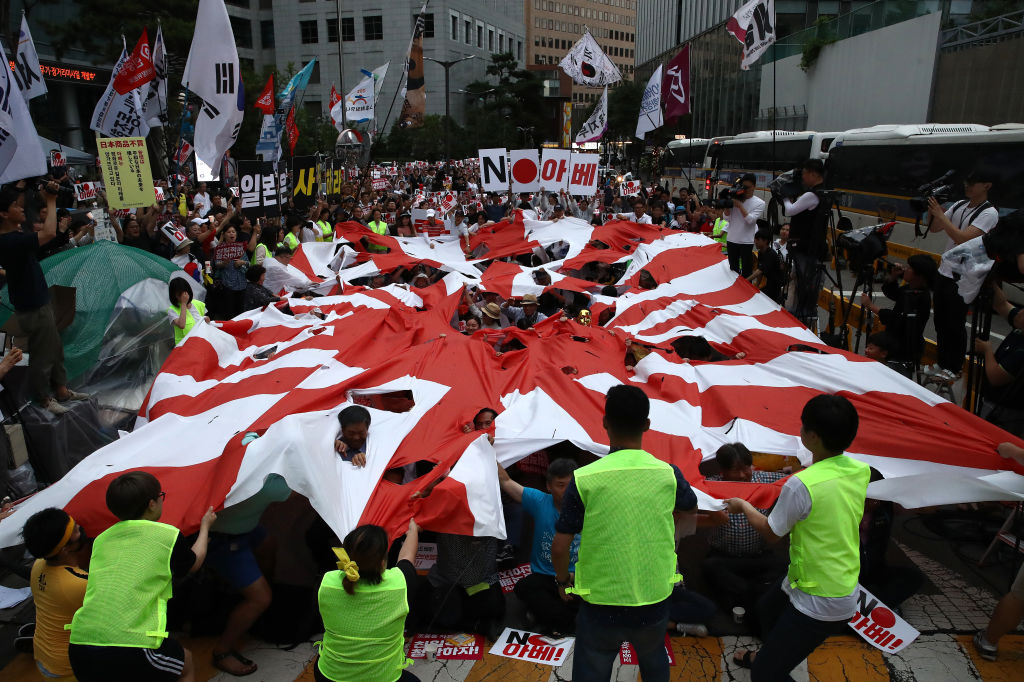Japan’s deepening diplomatic crisis with South Korea
Posted By Lauren Richardson on September 16, 2019 @ 12:45

Japan’s relationship with South Korea is not amicable at the best of times. Yet in recent months it has entered a rapidly descending diplomatic spiral of unprecedented depth and scope. Mounting bilateral friction over the intractable ‘history problems’ is steadily bleeding into the economic and security realms of the relationship. The result is a bilateral trade war with potential repercussions for the global supply chain of high-tech devices.
On the surface, it appears that a series of contentious developments in their longstanding history problems drove Tokyo and Seoul to this crisis point. South Korean President Moon Jae-in reneged on a diplomatic accord in 2018 that was purported to ‘irreversibly’ settle the ‘comfort women’ issue. The South Korean judiciary is also growing increasingly incessant in demanding Japanese companies pay damages to the Koreans mobilised for wartime labour.
These bilateral developments are doubtlessly playing a central role in the deterioration of Tokyo–Seoul relations. Yet there are broader strategic parameters to this dispute that have also shaped the contours of diplomatic friction, and these are largely being overlooked.
In short, there has been a major divergence in Seoul’s and Tokyo’s strategic views towards North Korea. This began to develop in January 2018 when Seoul embarked on a rapprochement with Pyongyang, while Tokyo’s policy on North Korea remained fundamentally unchanged. This strategic divergence, which has continued to deepen with time, undermined the ability of Japan and South Korea to cooperate in the security realm. By extension, it also reduced their diplomatic incentives to manage their history problems.
North Korea’s belligerence throughout 2017 encouraged Seoul and Tokyo to contain their diplomatic problems. As North Korean leader Kim Jong-un rapidly advanced his nuclear program, his missiles were frequently traversing Japanese airspace. The continental United States also came under potential threat with Kim’s successful launch of an intercontinental ballistic missile. These events provoked a rhetorical war between Kim and US President Donald Trump that threatened to escalate to a de facto war. Indeed, media reports emanating from the US indicated that Trump was seriously considering a preventive attack—a ‘bloody-nose’ strike—against North Korea.
This precarious security environment provided strong incentives for Seoul and Tokyo to cooperate in the defence realm, and their strategic outlooks on North Korea were aligned closely. Both sides were in favour of strong sanctions, intelligence-sharing and trilateral military exercises with the US. Defence cooperation necessitated keeping their ever-present history problems in check, as collaboration in this sphere has always been tenuous. Against this backdrop, Moon expressed opposition to the 2015 comfort women agreement but remained ambiguous as to whether or not he would dissolve it.
Yet when North Korea initiated an about-turn in January last year, the strategic views of Seoul and Tokyo quickly began to diverge. Kim extended an olive branch to Moon in his 2018 New Year’s address, suggesting that the two Koreas jointly compete in the Winter Olympics. Moon seized upon this conciliatory gesture, ushering in an inter-Korean rapprochement and a round of regional summitry. To ensure that the diplomatic door remained open to Kim, Moon was reluctant to provoke him, meaning that trilateral exercises with Japan and the US became problematic.
Yet, from Tokyo’s point of view, little had changed with regard to North Korea. Japanese Prime Minister Shinzo Abe was not prepared to risk political suicide by following suit with his South Korean and US counterparts. The issue of Japanese abductees takes precedence over the North Korean nuclear threat in Japan, and Abe’s domestic political success [1] is explained in part by his hardline stance towards Pyongyang on that issue. Consequently, Tokyo became sidelined from the regional summitry.
Amid this growing strategic divergence, Moon unilaterally dissolved the comfort women accord in November 2018. In the same month, Tokyo announced that it would appeal to the International Court of Justice over a South Korean court ruling concerning Korean forced labourers. Relations took a further downturn in January, when the two governments disputed whether a South Korean navy destroyer had locked its targeting radar on a Japanese maritime patrol aircraft.
This downward spiral in Tokyo–Seoul relations is being compounded by their mutual US ally taking more of a backseat than usual in the dispute. Normally, Washington would be strongly encouraging its two key Asian allies to maintain their security cooperation despite their diplomatic issues. But this is now complicated by the fact that Trump supports [2]—at least in practice—South Korea’s rapprochement policy towards North Korea and is thereby deepening the Tokyo–Seoul strategic divergence.
Although Pyongyang has now resumed missile testing, it’s doubtful that this development will provide an incentive to Japan and South Korea to repair their relations. Moon is likely to continue pursuing his rapprochement policy with North Korea, and there has already been too much bilateral damage done in the current dispute between Tokyo and Seoul.
There is no clear way out of this diplomatic crisis. But it’s evident that Seoul and Washington are likely to persist in engaging North Korea and working towards denuclearisation—at least for the foreseeable future. If Tokyo and Seoul wish to pave a foundation for mending their ties, they must recalibrate the strategic parameters of their relationship. Their relations will need to be predicated on mutual engagement with North Korea, rather than the mutual isolation of the past [3]. To achieve this strategic convergence, Tokyo will need to try to end its longstanding impasse with Pyongyang.
Article printed from The Strategist: https://www.aspistrategist.org.au
URL to article: https://www.aspistrategist.org.au/japans-deepening-diplomatic-crisis-with-south-korea/
URLs in this post:
[1] Abe’s domestic political success: https://www.eastasiaforum.org/2019/09/02/abes-remarkable-political-record-leaves-japan-still-searching-for-a-new-way/
[2] supports: https://www.eastasiaforum.org/2019/08/19/can-trump-provide-north-korea-with-credible-guarantees/
[3] mutual isolation of the past: https://www.eastasiaforum.org/2019/05/09/healing-japan-and-south-koreas-cold-war-wounds/
Click here to print.